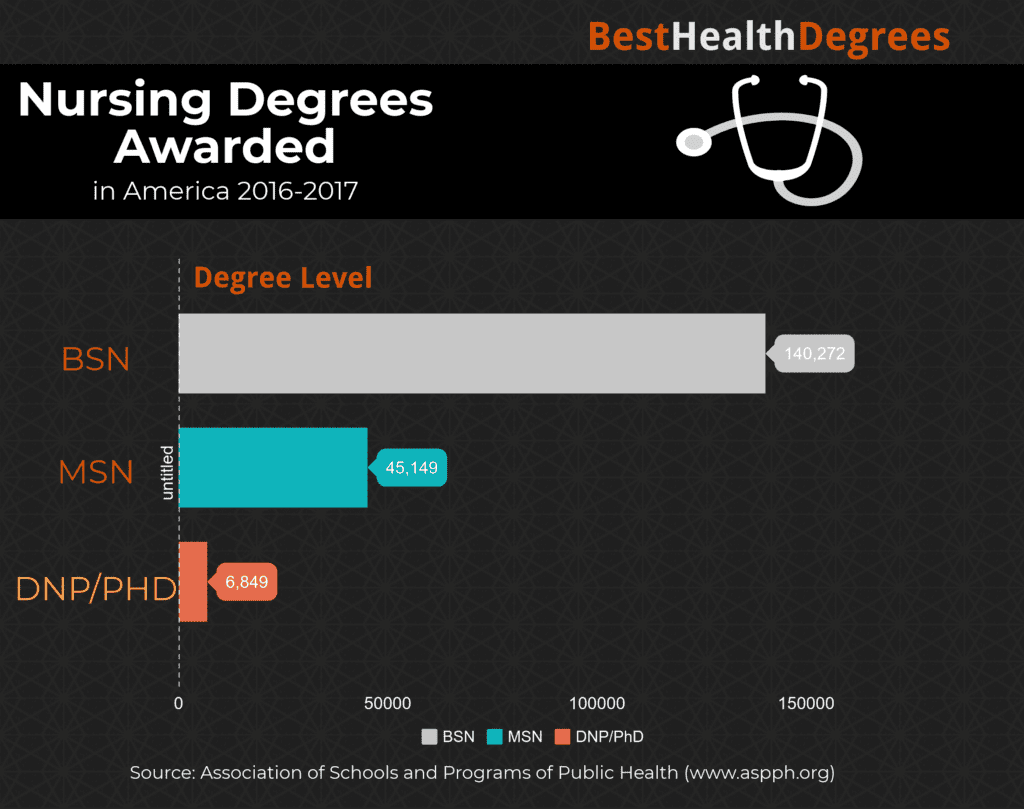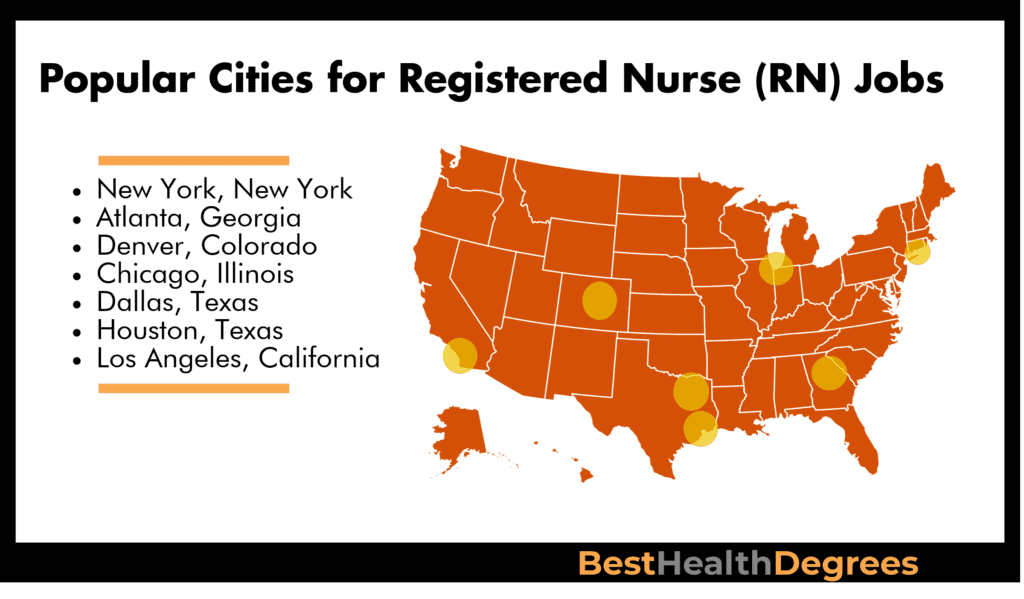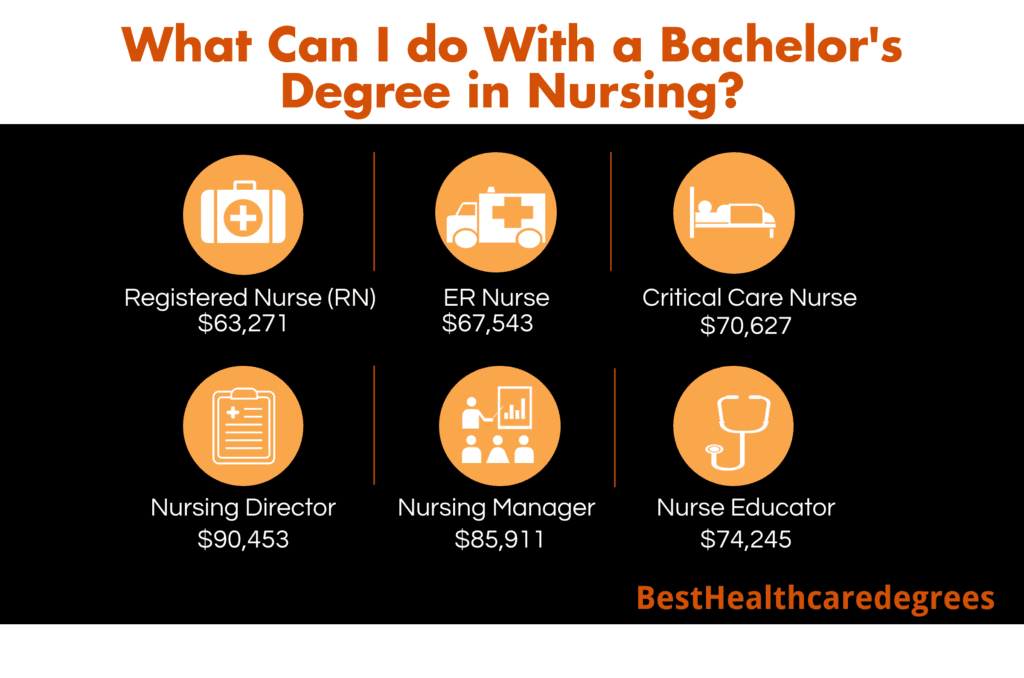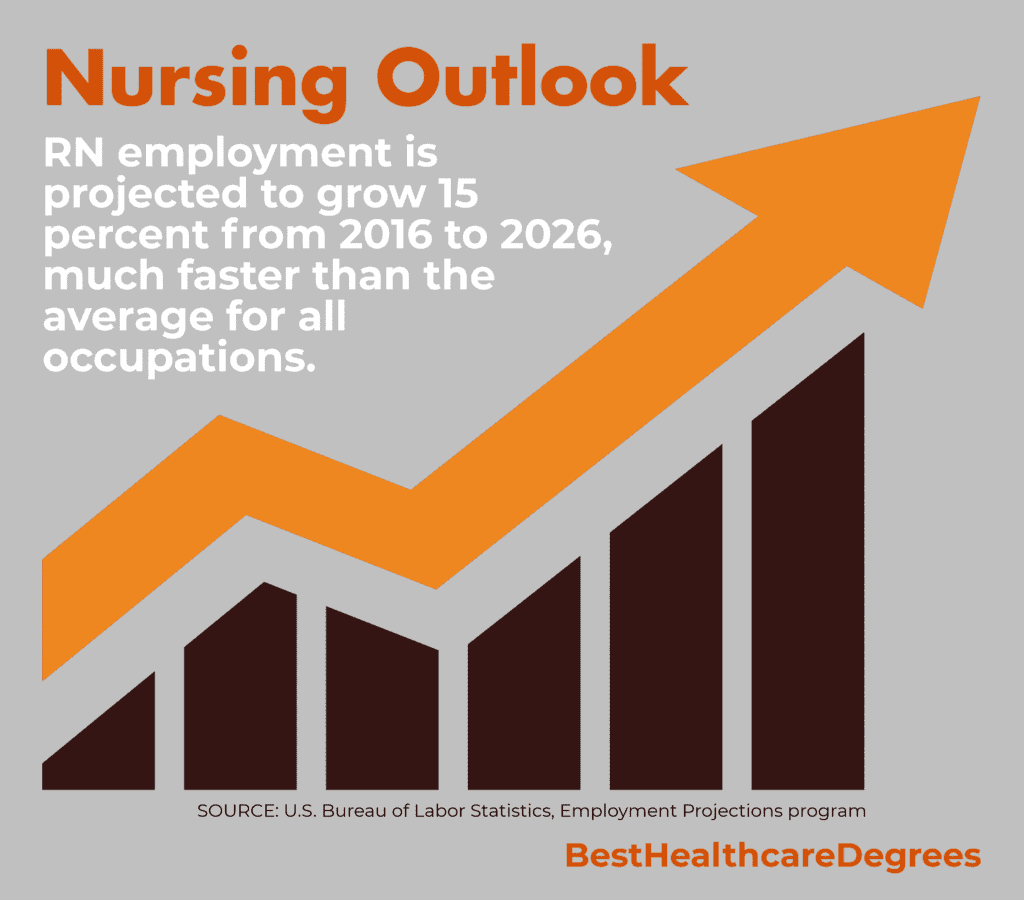Key Takeaways:
- BSN degrees enhance career opportunities in nursing, providing advanced skills and better job prospects compared to ADN degrees.
- Accreditation from recognized bodies like ACEN or CCNE is crucial for nursing programs, ensuring quality education and wider acceptance.
- BSN education includes specialized courses such as healthcare law, public relations, and medical ethics, preparing students for diverse roles.
- Salary expectations for BSN-qualified nurses are generally higher, reflecting their advanced training and potential for leadership roles.
There are many BSN career options for RNs who pursue their bachelors. Some places even offer incentives for nurses for this purpose. Depending on the location, a nurse doesn’t always need a bachelor’s degree in nursing to become a Registered Nurse (RN). However, having a bachelor’s degree in nursing is one of the best ways to guarantee to pass the NCLEX and earning the status of RN.
This can all seem a little confusing, but the bottom line is that there’s a difference between an RN and a BSN. An RN or registered nurse doesn’t always need a bachelor’s degree to obtain that position. In many places, an ADN or associate degree in nursing accompanied by proper NCLEX testing can help someone become a Registered Nurse (RN). This can make some wonder if a BSN degree is worth it.

What Are the Benefits of a Bachelor’s in Nursing Degree?
Do you wonder if you should get a BSN in nursing? Registered nurses with a BSN have many advantages. In some places, a BSN degree is required to become an RN. Even in areas where this isn’t the case, the applicant with the BSN degree will almost always look better in the eyes of an employer than an RN that doesn’t have their BSN.
A bachelor’s degree program not only provides more advanced skills and clinical experiences but carries greater weight on the job market. This is why a BSN degree in nursing is necessary.
In addition, advancement in the nursing field or taking on a specialty will typically require a BSN. In almost all cases, it’s better to obtain a BSN for those who want to pursue a career in nursing. That’s just another reason a BSN in nursing is essential.
Other benefits of a BSN include:
- Better and more nursing job opportunities
- Better preparation for expanding nursing roles
- Increased likelihood of a promotion or obtaining leadership positions
- Lessens the amount of time needed to enter advanced nursing roles
- Training for various roles in different settings
Many healthcare groups and facilities actively urge nurses to pursue their bachelor’s degree in nursing. Is a BSN worth it? To anyone who wants to pursue a nursing career, a BSN is worth pursuing.
How Do I Choose the Right BSN School or Program?
Is Accreditation Important? Many paths exist toward earning a Bachelor of Science in Nursing (BSN) degree. Generally, applicants will want to look for an accredited BSN program. For a nursing program, nursing school accreditations from the proper groups are of the utmost importance.
This means applicants should look for a reputable school and ensure that the program has the correct nursing school accreditations. Even a list of accredited nursing schools will need some vetting. But, to do that, applicants need to understand more about accreditation and how it works.
What is Accreditation for a Nursing School or Program?
Many types of accreditation exist for nursing schools and nursing programs. Applicants should first check for regional accreditation. Regional accreditation means a school, college, or university meets or exceeds the educational standards set by a specific region’s governing accreditation board. These seven agencies, recognized by the Council for Higher Education, set standards mainly for brick and mortar schools.
Accreditation from one of these agencies means a school specifically applied for the accredited status and received it after meeting the agency’s requirements. As the most recognized form of accreditation, regional accreditation typically means a student can transfer credits far easier between schools, should they need to? Nevertheless, this type of accreditation is usually for the facility itself and not specifically for the nursing program the school may have.

Nursing School Accreditation
When choosing a school’s nursing program or a dedicated nursing program, students must look for specialized accreditations specifically for BSN degree programs. Several accrediting agencies exist for these programs, but some nursing school accreditations hold more weight than others.
Below are the two primary accrediting groups for nursing school accreditation.
- Accreditation Commission for Education in Nursing (ACEN)
- Commission on Collegiate Nursing Education (CCNE)
Other nursing accrediting bodies exist as well, but the CCNE accredited schools, and ACEN standards are those most looked for. This also applies to online programs. Online nursing programs accredited by one of these groups are programs that have just as much reach as ACEN or CCNE accredited schools.
Applicants may also come across NLN accreditation. Understand that NLN accreditation typically means ACEN accreditation as the ACEN is a subsidiary of NLN. Applicants must show care, though, because the CNEA is also a subsidiary of NLN, and offers accreditation, but the CNEA is not recognized nationally as an institutional accrediting agency. This means applicants should specifically look for ACEN standards.
Accreditation Competencies
All accrediting groups under the NLN accreditation umbrella adhere to NLN competencies. The 11 core competencies of nursing include:
- Collaboration and teamwork
- Communication
- Ethical and moral responsibilities
- Health education
- Legal responsibilities
- Management of resources and environment
- Personal and professional development
- Quality improvement
- Record management
- Research
- Safe and quality nursing care
Understanding the NLN competencies or 11 core competencies in nursing can help applicants understand what an education from an ACEN accredited school will entail. That’s for those wondering if ACEN accreditation is good.
The Commission on Collegiate Nursing Education (CCNE) accreditation group is wholly comparable to ACEN accreditation. CCNE accreditation standards apply to nearly 600 schools and programs across the nation. So, applicants can rest assured that CCNE accreditation is well respected and well known. CCNE nursing curriculums only apply to bachelor’s and master’s programs.
ACEN vs CCNE
For those looking for an ACEN vs CCNE comparison, the CCNE accreditation and ACEN standards both work well for creating industry-acceptable BSN graduates and degrees. Suppose a school, program, or list of accredited nursing schools carries either of these standards in nursing education. In that case, the applicant can confidently choose the program without worrying about an ACEN vs CCNE comparison.
Once again, online nursing programs accredited by these groups, or other types of programs, such as accredited RN to BSN online programs, are all viable. So, for nursing school accreditation, what to look for are these groups above others.
What Are the Different Types of Nursing Bachelor’s Degrees?
Several types of nursing bachelor’s degrees exist. Generally, there are three BSN types for nursing, but there are also various nursing specializations. In addition, nursing bachelor’s online options also exist.
Bachelor of Science in Nursing (BSN)
BSN degree programs typically require a four-year, full-time commitment. Someone enrolled in a traditional BSN program will take all the proper classes to prepare them for various nursing duties. Students will also receive learning to prepare them for the NCLEX exam.
Students enrolled in BSN degree programs can also focus on a specialization. Nursing contains numerous specialties, and choosing coursework geared towards those specialties is an excellent way to pursue a particular type of nursing right after graduation.
RN to BSN – Registered Nurse to Bachelor of Science Nursing
These programs are meant for those who already obtained an RN position without a BSN. Applicants pursuing this bachelor’s degree in nursing may already have an ADN or another type of degree and have experience in the nursing field.
As many nurses fit this description, the RN to BSN is a popular choice. These programs typically take far less time than a traditional BSN program and lend themselves well to fast-track RN to BSN online programs or other accelerated nursing programs.
Accelerated Bachelors of Science in Nursing
Usually, accelerated nursing programs refer to BSN programs geared towards students who already have a bachelor’s degree in a different field. These programs can use credits earned for unrelated degrees and narrow down coursework for a far faster BSN achievement.
Other accelerated nursing programs also exist and typically include intensive, fast-track programs. Applicants to these programs need to know what they’re getting into. Something like an accelerated 1 year BSN online program can have the intensity that some people aren’t quite prepared for.
What About Online BSN Programs?

Applicants can find all the different types of nursing degrees online. Obtaining a bachelor’s in nursing online comes with the same considerations as obtaining a BSN in any other way. Applicants must look for bachelor’s in nursing online programs with a good reputation and accreditation.
The best online programs are comparable to the best traditional BSN degree programs. Nevertheless, finding the best online BSN degree programs takes a lot of research and diligence.
A nursing bachelor’s online program can often offer a lot more flexibility. That flexibility can become extremely important for those who need options to still work or take care of a family. The different types of nursing degrees are all available. For example, an applicant can find:
- Accelerated 1 year BSN online programs
- Fast track RN to BSN online programs
- Online BSN programs for non nurses
- Online LPN nursing programs
- RN to BSN online (no clinical)

What Kind of Certifications and Licenses Do BSN Nurses Require?
The nursing field comes with several licensing and certification considerations and requirements. In most cases, RN licensure is necessary to practice BSN nursing. RN certification requirements can vary based on where the applicant wants to work. Nursing certifications and RN licensure aren’t the same things.
The path toward nursing certifications and nursing licensure can vary depending on the state an applicant is applying. Typically, applicants must apply for a license through their state’s Board of Nursing. The applicant will also have to take and pass the proper NCLEX exam.
Different states may have further requirements, and some healthcare groups or facilities may also have additional qualifications for registered nurse certification. In some cases, it’s possible to gain nursing board certification or nursing certifications for nursing students while attending a nursing program. Nursing certifications for new grads are possible if the graduate has started applying with the state and signing up for the correct NCLEX exam.
What is the Nurse Licensure Compact?
The Nurse Licensure Compact allows registered nurses to use their license in multiple states without the need to reapply or seek nursing license renewal in different areas. However, not all states are part of the Nurse Licensure Compact, so nurses who move around may have to seek nursing license renewal in certain places or gain a fresh nursing board certification.
Depending on the state and position, applicants can sometimes receive nursing certifications online. When pursuing nursing certifications online, applicants should ensure it’s the proper certification for their needs.
The qualifications for registered nurse jobs can often dictate the need to obtain specific certifications before the nurse can begin work. Sometimes, they can obtain these nursing certifications without experience, but, once again, this typically applies to certifications for particular jobs.
What Types of Nursing Careers are Available with a Bachelor’s?
A BSN nurse has many job opportunities and career paths. Nursing careers and the types of nursing careers available to BSN nurses vary greatly. Many nursing positions involve direct patient care, but some nursing careers are available in roles that do not involve patient care. Some nurses work in the operating room and others in nursing homes. And a critical care nurse cares for patients with life-threatening illnesses. Below are some career options and nursing specialties in demand.
- Flight Nurse / Flight Nurses / Flight Nursing
- Critical Care Nurse / Critical Care Nurses
- Labor and Delivery Nursing
- Nursing Informatics Specialists / Informatics Nurse
- Clinical Research Nurse / Clinical Research Nurses
- Nurse Informaticist / Nurse Informatics
- Geriatric Nurse / Geriatric Nurses
- Neonatal Intensive Care Nursing
- Nurse Anesthetists (CRNAs)
- Nurse Educator / Nurse Educators job
- OB-GYN Nursing
- Nurse Case Manager / Nurse Case Managers
- School Nurse / School Nurses / School Nursing job
- Nurse Manager / Nurse Managers
- Travel Nurse / Travel Nurses / Travel Nursing
- Public Health Nurse / Public Health Nurses
- Clinical Research Nurse / Clinical Research Nurses
This isn’t an exhaustive list of the different types of nurses and descriptions out there. For example, a nurse with a master’s degree can be a nurse practitioner. Generally, any healthcare field, niche, or specialty will likely have a corresponding nursing position. However, the different types of nurses and descriptions can mean where that nurse practices. An emergency room nurse and a burn unit nurse require different skill sets. Even in the same hospital, the work environment of a nurse can vary.
Nursing and Location
Nursing careers in a city can vary significantly from those in rural areas. Equally, working in a hospital as an RN and working in a nursing home as an RN are entirely different things. The types of nurses and salaries available will depend on many factors.
The types of nursing professionals that work with the elderly aren’t always the same types of nurse professionals who work with children. This all means that nursing career options are very broad. So, aspiring nurses entering the nursing field should develop a general idea of what it is they would like to do.
When searching for “nursing careers near me,” or best nursing careers, applicants should pay close attention to the types of nursing careers that show up and the nursing specialties in demand in their area. The types of nurses and salaries that show up in a nursing careers list will also have to do with the location and the work environment of a nurse in that setting.
In all cases, the best nursing careers start with BSN nursing jobs found on a nursing careers list. Not all types of nursing jobs and salaries require a BSN degree. The list of nursing fields only expands, and applicants can reap the better benefits of nursing career options that require a bachelor’s.

What are the Salary Expectations for BSN Nursing?
A bachelor’s in nursing salary will vary based on location, specialization, and type of nursing application involved. Across the board, with RN vs BSN salaries, BSN nursing careers salaries are higher than those with an RN but no degree. And when it comes to ADN vs BSN salary, the BSN degrees pay more.
The average salary is between $69k and $81k, depending on the source. Those numbers can vary widely depending on the nursing position. Specialization or leadership roles increase a nursing career’s salary and experience. In all cases, a BSN salary can always grow.
Some wonder how much nurses make an hour starting or how much a nurse makes a month. An RN can start at any salary within the average range. Once again, this depends on several factors. According to the OOH, the lowest 10% of Registered Nurses (RNs) earn about $50k/year, around $24/hour, or around $4,000/month.
Always keep in mind that how much a nurse makes a month will have calendar variables. This also applies to how much nurses make an hour starting, as hours can become quite flexible in some nursing environments. A bachelor’s in nursing salary is a good one. Additionally, BSN graduates earn higher salaries than Registered Nurses (RNs) with only a two-year ADN.
Are There Any Professional Organizations for BSN Nurses?
Nursing is a very large field, and as such, there are numerous professional organizations dedicated to nursing, nurses, and healthcare. These organizations exist at the local, state, and national levels. Even international nursing organizations exist.
Nurses can also find professional organizations dedicated to specific niches and specializations of nursing. For example, there are pediatric nursing organizations. Some searching narrowed by specialty will often show several professional organizations, even with free nursing association memberships.
Schools can also have nursing organizations, so students don’t have to wait until graduation to join a professional group of like-minded individuals. Students can check to see if their schools, colleges, or universities have nursing organizations for students or access to free nursing association memberships.
Professional Organizations
Any nurse at any level would do well to join one or more professional organizations. Professional nursing organizations purpose is typically to educate people in the profession and provide resources for them. Altogether, professional nursing organizations purpose will help to improve the industry.
These groups provide benefits ranging from networking to career opportunities. Many of these groups offer seminars, continuing education, opportunities for advancement and can help someone gain access to schools or programs. Nursing organizations for students can also help with internships.
Outside of the smaller or local organizations, there are some sizeable notable nursing organizations. Any list of the top 10 nursing organizations will likely include some of the following:
- American Academy of Nursing
- American Board of Nursing Specialties (ABNS)
- American Nurses Association
- International Council of Nurses (ICN)
- National League for Nursing (NLN)
- National Student Nurses Association (NSNA)
There are even groups of organizations, such as the Nursing Organizations Alliance.
In most cases, the American Nurses Association takes the top spot as the most recognized organization. But, a top 10 nursing organizations list doesn’t even scratch the surface of the number of professional nursing organizations. Whether it’s international nursing organizations or local pediatric nursing organizations, these groups are well worth a person’s consideration.
Your Career with a BSN
Across the healthcare industry, there is a need for nursing skills. Healthcare organizations and medical facilities need nurses to complete routine physical examinations, assist with medical procedures, work in emergency departments, and maintain electronic health records. So if you are interested in a career in nursing, a bsn completion program may be a great career move!
Related
- 25 Best Traditional BSN Degree Program
- What Jobs Can You Get With a Health Science Degree?
- What Can I Do with a Bachelor’s in Nutrition?
- Best Types of Counseling Degrees
- Kinesiology and Exercise Science Salary
- What Can You Do with a Human Service Degree
- What Can You Do With a Master’s in Psychology Degree Program?
- 10 Cheap MSN Online Programs
- CNA Degree and Educational Guide
- The 10 Cheapest Psychology Degree Online